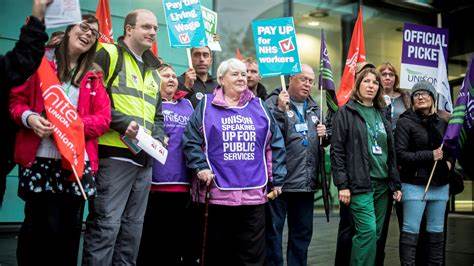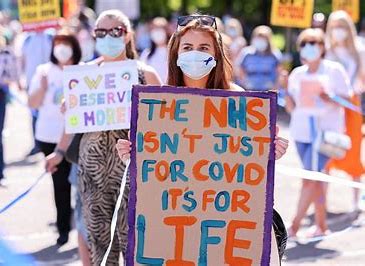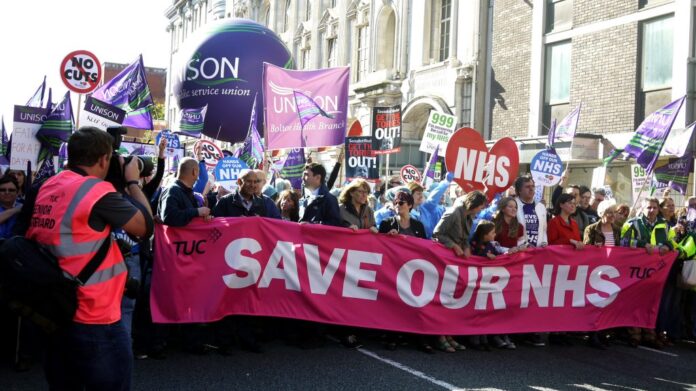The National Health Service, or NHS as is widely known, is under serious threat from successive UK governments, over a period of at least twenty years. This also includes the period under the Blair / Brown Labour government. The NHS has been repeatedly undermined and underfunded.
The character of the attacks
The complexity of the attacks and their many facetted dimensions would produce enough copy to fill a library. Indeed, the complex nature of the systems used to reduce the quality and effectiveness of the NHS are a deliberate tool. They are a device to obscure the real nature of governments, especially Conservative governments, desire to dismantle the NHS bit by bit and allow the private sector to profit from it. The philosophical opposition to a health service free to all according to their needs is an anathema to the neo-liberal agenda that dominates the British political system.

The drive to undermine its credibility and performance has been clear right across the media. The BBC – a loyal tool of the ruling class and its most effective arm of propaganda, has a long history from at least the 1990s of using any excuse to chip away at the public’s confidence in the NHS and promote ideas in favour of private sector involvement. On the 8th December, for example, the Today programme, which has an audience of about 7 million listeners, broadcast an extended interview with a private GP (General Practitioner) company which is profiteering from the underfunding and privatisation of the NHS. At no point was the company representative questioned about the extent of their profits. Trades unionists are never given such a free ride. In the current wave of strikes the BBCs emphasis is always on the disruption caused to the public. Interviews with trades unionists are often characterised by leading questions, which attempt to undermine the unions’ position. On the Today programme of the 13th December, Mick Lynch, the general secretary of the RMT (Rail, Maritime and Transport union) refused to answer questions asked by the interviewer, Mishal Hussain. He correctly pointed out that the BBC parrots the right-wing press.
“Why are you pursuing an editorial line I could read in The Sun or The Daily Mail or any of the right-wing press in this country, and you’re not pursuing the fact that working people – millions of them – are being impoverished and some of them being made destitute by the attitude of this government and by their employers? I find this a shocking stance that the BBC will take – you’re just parroting the most right-wing stuff you can get hold of on behalf of the establishment, and it’s about time you showed some partiality towards your listeners, to working-class people in this country who are being screwed to the floor by the attitudes and policies of this government.”
As mentioned above, this parroting of the right-wing press has been going on for decades. The Blair (Labour) government sought to demonise teachers and the NHS – paving the way for the academisation of schools and for profiteering in the NHS. However, listeners are beginning to understand that the BBC is a tool of the state and its editorial line cannot be trusted. Few on the left of politics would see the BBC as the impartial agency it once purported to be.
Nurses strike
The nurses and other NHS workers are currently in the fight of their lives. Their perfectly reasonable pay demands are rejected out of hand and they are being treated with paternal arrogance by the government. At the same time instead of charging to the rescue and attempting to cost a package that would reward public sector workers, the Labour Party, on message from the City rather that the trades unions, sits on its hand.
Strikes are due to build, rather than lessen in the New Year and workers faced with poverty wages will have no choice but to struggle. At the same time there are massive staffing shortages across the NHS with 46,000 nursing posts vacant and most wards rarely having satisfactory levels of workers.

The public is clearly on the side of the strikers, especially the nurses and has little faith in the government. In a recent IPSOS UK poll, 62% of respondents said that Britain was heading in the wrong direction, with only 14% feeling optimistic. The government is also seen as double-dealing in its behaviour. Recently it has been revealed that the government has given Whitehall (government) civil servants £64 million in bonuses in the form of gift vouchers, but expects everyone else to suffer in silence.
There is a growing body of support for NHS workers in struggle. Campaigning groups, such as Defend our NHS and Keep Our NHS Public, do sterling work at trying to challenge NHS Trusts and hold service providers to account as well as raising public awareness and promoting struggle. The various campaigning groups now operate under the united banner of SOS – NHS. People are frustrated by the low level of involvement in this initiative but the strikes into the new year will bring a new focus and new momentum.
Problems of the NHS
The problems with the NHS are profound. They don’t only relate to the covid pandemic, which is still a problem for the NHS, but also to a chronic lack of funding alongside the misuse of funds that are provided.
The NHS has in fact ceased to be a national service. It now runs under the auspices of 42 regional integrated care systems (ICS). These ICSs are given funding from the state and are expected to manage these finite funds on an annual basis. There is no overall plan for the NHS, simply a free-for-all. ICS competes with ICS for resources. This is the end of national terms and conditions in the NHS, with ICSs seeking to develop their own sets of terms and conditions as is happening in schools. This could lead to a race to the bottom unless workers and the unions seek to organise in a concerted way to prevent this.
From now on GPs and dentists will only have to provide core services. Dental care in the UK has already broken down under this type of framework, with it becoming almost impossible in some regions to go onto an NHS dentists register and more and more services being provided as “private”. Many dentists’ surgeries no longer provide services to NHS patients, complaining that they are not profitable. Could GP practice head in the same direction?
Private Finance Initiatives (PFI)
It was reported in the Guardian in October, that £500 million per year is being spent on repaying PFI loans. Because of the difficulty accessing this information, this is probably a significant under-estimate. These schemes were promoted by the Blair government, as a means of getting the private sector to invest in new hospitals and schools. New hospitals and schools were built, but with loans that would burden the hospital or schools with increasing levels of debt for decades. Money is therefore poured into repaying the loans rather than providing services.
The private sector is now allowed access to up to 50% of NHS contracts. It doesn’t seek to own the whole of the NHS, but to cherry-pick the profitable, straightforward services and leave the complex, long-term and chronic services to the state. This again means that resources that should be going to the NHS are taken as profit by the private sector. Most consultant doctors carry out private as well as NHS work. There is a culture of running the public and private sector together for both corporate profit and personal greed. The private sector doesn’t train the doctors and nurses who work for it. It carries all of the benefits and none of the risks. If a service is no producing a profit the private sector simply dispenses with it and the NHS has to take the strain once more.
Pharmacy is also run for profit. The cost of drugs can be increased by suppliers at any time and the NHS has to find the money. Big pharma has shown its predatory attitude to the NHS for decades. Simple drugs such as paracetamol are sold to the NHS at way above the price one would pay at a local supermarket and wholesalers can vary the price they demand from the NHS on a whim. As with PFI contracts, how these crazy deals are ever signed off beggars belief.
Demands for a real NHS
There is still overwhelming public support for the NHS, but for an NHS that is properly funded and run for the benefit of patients and not private profit.
There is a demand for:
- a fully publicly funded NHS, that has no charges, such as dental or prescription charges,
- a reversal of all privatisations – for the NHS to be run for the benefit of patients, not profit,
- for PFI contracts to be scrapped, without compensation on the grounds of national emergency,
- for nationalising the whole of the health care sector and running it alongside the NHS,
- for all workers to be on union negotiated national contracts,
- for hospitals and the NHS to be run by workers and communities, not boards of directors,
- for GPs and dentists to be taken into the NHS.
In the period to come, the political awareness of NHS staff and those who depend on the NHS, which is 95% of the population, will grow. There are already calls for a general strike with the new general secretary of the Trades Union Congress (TUC) Paul Nowak on Sky News on 30th December, not ruling it out.
“Our unions will be continuing to talk into the new year about how we best support and coordinate unions that are taking strike action,”
he said.
The fight is on for our unions and for the NHS. We should enter the New Year and the months ahead with confidence. This government does not have the support of the people and organised, determined action can bring victories for the workers. If workers and campaigning groups act together, they can win together. Let’s hope that the TUC, the unions it represents and those unions outside of the TUC can work together and win together.



